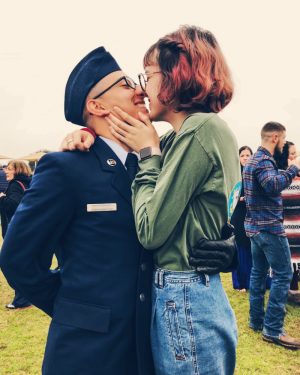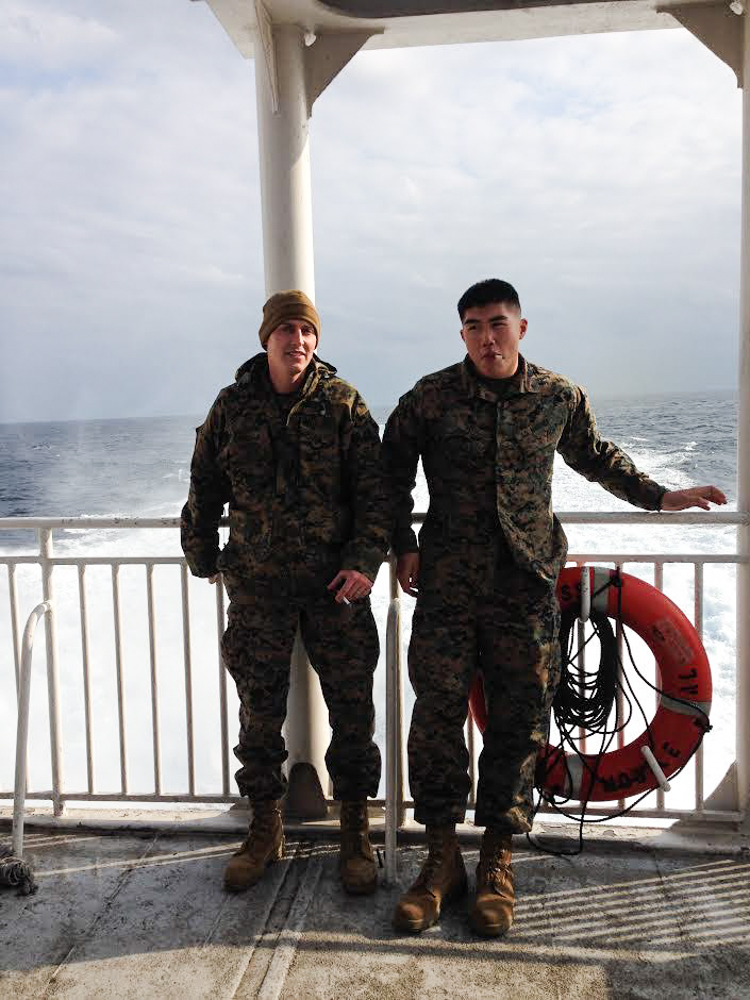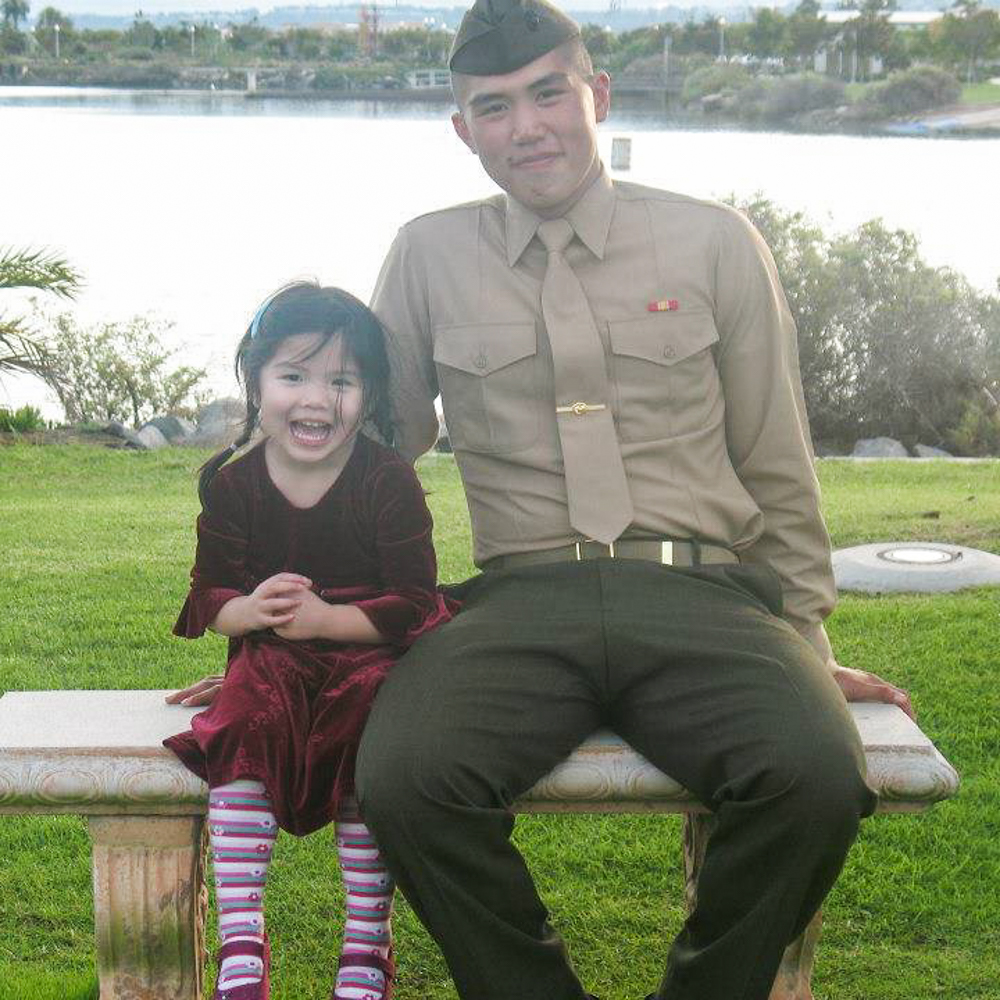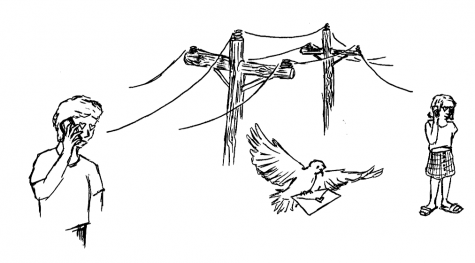Are Whitties Open to Discussing the Military?
April 11, 2019
What’s it like to have ties to the military in a relatively small, liberal arts college environment? A few students at Whitman share in this very experience, and can attest to how it affects their interactions on campus.
Junior Julia Wilke is in a long-distance relationship with her boyfriend Gabe Rothbart, a member of the United States Air Force who works on special vehicles maintenance. He made the decision to join the military a month into their relationship, she recalls, seeking structure in his life and increased economic stability.
Wilke says that a common misconception she encounters has to do with why people decide to join the military in the first place.
“It’s like this idea that people join because they have a hero complex,” said Wilke. “A lot of people actually join because they either can’t afford to go to college or maybe their parents kicked them out or are not supporting them financially or as is they just don’t have enough money to support themselves, and the military provides a lot of financial support and benefits.”

Junior Julia Wilke and her boyfriend Gabe Rothbart who is serving in the Military.
When Wilke attended Rothbart’s graduation from basic training — the training that is provided to prepare new military personnel — she recalled the vast array of people she met and how her own preconceptions shifted.
“I just had this moment of realization where a lot of my fears about what that whole experience would look like came from this idea that had been ingrained into me I guess by the media… how it [the military] works, that it’s this terrible place that people are forced to go, when a lot of people actually go there on their own for their own reasons and there are so many different types of people there.”
Trung Vu, a Whitman computer science major from Olympia, served in the United States Marine Corps as a data systems technician, traveling overseas to Japan, Korea and the Philippines, spending his last year in Southern California.
Looking for a drastic change in his life and increased financial stability, Trung Vu decided to join the military in 2012.
“At the time I remember feeling very daunted by [potential] student loans,” said Vu. “Both my parents are right around the poverty level, so I was managing a bunch of finances on my own and trying to figure things out.”
Unique in his position as a veteran student at Whitman, Trung explains that he doesn’t bring up his experiences in the military too often in casual conversation.
“I feel like it’d be easy to box me into that kind of identity, so I try to avoid that,” he said.
When Whitman students do find out he was in the military, he detects curiosity but not overt bias against his time serving in the military.
“I think students are pretty good about not associating all of the U.S. foreign policy fallouts on me,” said Vu. “I don’t really perceive any bias. But at the same time, I do kind of underplay it. I really don’t bring it up, unless someone asks me.”
Vu notes that in his vastly different experiences in the Marine Corps compared to his time at Whitman, he has at times felt the need to understate aspects of himself.
“Even being in the military, I felt like I had like a minority kind of opinion. I was very liberal, I even underplayed that,” said Vu. “And now that I’m here [at Whitman] I also underplay being in the military.”

Whitman Junior Trung Vu served in the Marines prior to attending Whitman.
For Wilke, while she has felt comfortable discussing her relationship with close friends, there have been instances where she feels her connection to the military has not been as welcomed at Whitman.
She recalls one instance in particular, when a Whitman peer commented on a picture Wilke posted on her Instagram showing that she was about to go to her boyfriend’s basic training graduation ceremony, using the post as an opportunity to voice an opinion about the military at large.
“If I’m talking about how my boyfriend makes me happy, that’s a different conversation from like what do we agree with and disagree with about the military — those are very different conversations, and I’m willing to have that conversation with people, I just wasn’t expecting that,” said Wilke.
Wilke explained that she understands why, when certain people find out her boyfriend is in the military, they feel the need to voice their opinions about the military as a whole.
“I completely understand and I would never want to invalidate that and I respect that opinion, but also like where does that come from?” Wilke questioned. “What are you basing that off of and where did you get that information, because a lot of what is in the media about the military is not necessarily true, and it doesn’t all pertain to what my boyfriend is doing.”
Junior Sofia Gispert Tello, whose significant other serves in the Marine Corps, has had similar experiences with social media.
“I definitely don’t bring it up much at all on campus to the people that are not my friends, but I think when I post on social media or Instagram and stuff I have had, I don’t know, people are weird about it,” Gispert Tello said. “I feel like they’re just uncomfortable.”
Gispert Tello explains that at times she has felt a tension between wanting to support her boyfriend without it being perceived as advocating for the military as a whole.
“I want to be as proud as possible of my boyfriend and supportive, but at the same time I don’t necessarily agree with all that is happening or all that goes on within [the military],” Gispert Tello said.
Wilke hopes that people unfamiliar with the various reasoning as to why people join the military will recognize the diversity of opinion and range of the political spectrum she has heard about through her boyfriend’s experiences with peers in the military.
“Some people have to join the military because that’s their only option in order to sustain themselves and survive in the economy that we have,” she said.
Sal Goldblatt, a junior English major, agrees with this sentiment. He has had more than a few relatives serve in the military, including his uncle, aunt and grandfather who designed helicopters for the Air Force.
“There are lots of financial benefits, there are lots of benefits for veterans’ children and veterans themselves, so it can be a way of upward social mobility for a lot of people and, you know, I think at the heart of it is patriotism — not everyone has the same idea of what it means to serve your country, so I feel people in the military feel that that’s the way to serve their country,” he said.
While Goldblatt does not recall the military being frequently discussed by Whitman students, he does not feel it is perceived too well on campus.
“I don’t think I’ve ever really had a conversation about the military outright, but I feel like with our current political climate, people aren’t really too fond of it, and it has kind of a negative, aggressive perception,” said Goldblatt.
Goldblatt feels certain misconceptions pertaining to the military may stem from differences in upbringing and socioeconomic status.
“I feel like a lot of people here [at Whitman] come from a certain background where fighting is not a necessity. Part of why people might be negative towards the military here is because they’re removed from it; they don’t know what it’s like to view the army as an opportunity and not as a choice or profession.”
While Vu does not feel disrespected at Whitman or looked down upon for his involvement in the military, he has encountered various leading questions about his experience.
“A lot of the first questions people will ask me are like: ‘have you ever been to Iraq or Afghanistan?’ And that’s kind of like a veiled way of asking if I’ve killed anyone, which I haven’t,” he said.
Critical of the military himself, he feels Whitman has changed his mindset when it comes to a lot of institutional practices within the military, particularly the culture around women serving in the military.
“It was a very misogynistic culture I think, and I don’t think it’s a cultural thing and any one individual’s fault, I think it was like an institutional thing,” he said. “Whitman has also made me become critical of myself and who I was during that time.”
Trung credits the military, and in particular the time he spent working closely with Marine Corps members from across the United States, with widening his preconceived ideas about the belief systems of individuals around him that differed from his own.
“It helped me see outside of the political labeling that we have of lots of subgroups of people,” he said. “It helped me understand why people have certain views.”
Wilke herself feels that her relationship with Rothbart since he joined the military has changed how she views her own life and values.
“I think for people who are family members and significant others, it’s a really hugely different type of relationship than I feel like what you would normally experience. You have to think about things that you wouldn’t normally have to think about, like if they get deployed there is a chance that they could die,” said Wilke. “It’s really changed how I view things, and how I think about life, and what things I feel grateful for.”









